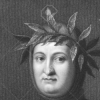Petrarch

Petrarch
Francesco Petrarca, commonly anglicized as Petrarch, was an Italian scholar and poet in Renaissance Italy, and one of the earliest humanists. Petrarch's rediscovery of Cicero's letters is often credited for initiating the 14th-century Renaissance. Petrarch is often considered the founder of Humanism. In the 16th century, Pietro Bembo created the model for the modern Italian language based on Petrarch's works, as well as those of Giovanni Boccaccio, and, to a lesser extent, Dante Alighieri. Petrarch would be later endorsed as...
NationalityItalian
ProfessionPoet
Date of Birth20 July 1304
CityArezzo, Italy
CountryItaly
Wanting is not enough, long and you attain it.
The greater I am, the greater shall be my efforts.
For though I am a body of this earth, my firm desire is born from the stars.
While life is in your body, you have the rein of all thoughts in your hands.
Books can warm the heart with friendly words and counsel, entering into a close relationship with us which is articulate and alive
You keep to your own ways and leave mine to me.
Do you suppose there is any living man so unreasonable that if he found himself stricken with a dangerous ailment he would not anxiously desire to regain the blessing of health?
To begin with myself, then, the utterances of men concerning me will differ widely, since in passing judgment almost every one is influenced not so much by truth as by preference, and good and evil report alike know no bounds.
From thought to thought, from mountain peak to mountain. Love leads me on; for I can never still My trouble on the world's well beaten ways.
Events appear sad, pleasant, or painful, not because they are so in reality, but because we believe them to be so and the light in which we look at them depends upon our own judgment.
I have friends whose society is delightful to me; they are persons of all countries and of all ages; distinguished in war, in council, and in letters; easy to live with, always at my command.
How difficult it is to save the bark of reputation from the rocks of ignorance.
Often on earth the gentlest heart is fain To feed and banquet on another's woe.
I had got this far, and was thinking of what to say next, and as my habit is, I was pricking the paper idly with my pen. And I thought how, between one dip of the pen and the next, time goes on, and I hurry, drive myself, and speed toward death. We are always dying. I while I write, you while you read, and others while they listen or stop their ears, they are all dying.